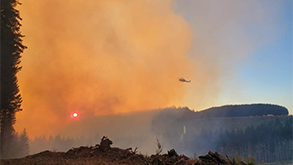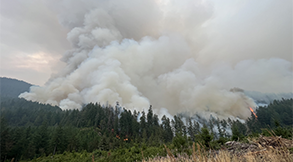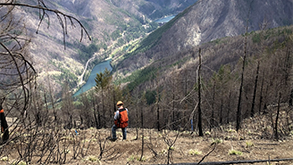 Fighting Fires Together
Fighting Fires Together
Supporting the mental health of firefighters, their families and our communities
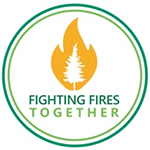
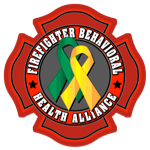
Each fire season, wildland firefighters risk their lives to protect our forests and communities, and Weyerhaeuser recognizes the impact fighting these fires can have on the mental health of first responders and their families. For the fourth year, Weyerhaeuser has partnered with Firefighter Behavioral Health Alliance to help provide specialized support and mental health resources for wildland firefighters. Addressing mental health challenges without stigma is critical to keeping firefighters safe, and the Fighting Fires Together campaign is designed to provide an important platform to amplify education and resources available for wildland firefighters and their families in the Pacific Northwest.
“After launching the Fighting Fires Together campaign with FBHA four years ago, we’re proud to continue this effort to support wildland firefighters and their mental health as they work in challenging conditions to protect our communities,” says Bill Frings, vice president of Western Timberlands for Weyerhaeuser. “Weyerhaeuser was an early leader in wildfire protection more than a century ago, and we continue to invest in cutting-edge technologies and ongoing training to improve our wildfire preparedness, prevention and mitigation strategies. As wildfire season has grown longer, we understand how critical it is to ensure wildland firefighters have access to the resources they need to carry out this important work.”
Fighting
Fires Together
Resources focused on behavioral health awareness, prevention and strategies to provide wildland firefighters and their families with an easily accessible and confidential source of information.
Find resources to help when communicating care and concern, as well as addressing the stigma of seeking behavioral support.
Finding a like-minded community or support group is an important tool for improving mental health.
Coverage on the Mental Health Impacts of Wildland Firefighting and Weyerhaeuser’s efforts in the Pacific Northwest.
Mental Health Tips & Resources
Firefighters risk their lives to protect our forests and communities, and the stress of wildland firefighting can have a significant impact on mental health. The following resources can help support frontline firefighters and their families.
- First Responder Behavioral Health Video Series: Focusing on topics affecting wildland firefighters, Firefighters Behavioral Health Alliance has created a video series based on their workshops for first responders.
-
Self-screening: This self-assessment serves as a suicide screening for firefighters. The assessment can serve as a general tool for checking on overall mental health.
-
Professional Directory: Partnering with an occupationally aware mental health professional can be critical to getting the right support. Below are counselors who have been vetted by FBHA and the National Volunteer Council in Oregon, Washington and British Columbia.
British Columbia
-
First Responder Health: A database of occupationally aware healthcare providers in Canada.
Oregon
-
AgriStress HelpLine is a free, 24/7 hotline for Oregon's agricultural and forestry communities, including farmers, ranchers, fishermen, foresters, and their families. Call or text: 833-897-2474
-
Matt Coffey, MA, LPC-A, Beaverton, 360-726-1605
-
Dr. Stephanie M. Conn, Beaverton, 971-250-1519
-
Craig Deardorff, MSW, LICSW, Beaverton, 971-727-4197
-
Cheryl Kolevzon, LCSW, Medford, 541-292-0403
-
Drew Prochniak, MA, LPC, LMHC, Portland, 503-308-9408
-
Michael Cady Russell, MS, NCC, LPC, Portland, 503-683-2341
-
Nadine Dody, LPC, Redmond, 541-699-2915
-
Andrew Barram, Psy. D. Bend, 541-388-3592
-
Rikki Davlin, LCSW, 208-505-6951 (available for telehealth in OR)
-
Emma Schutte, LMHC, 319-930-9247 (available for telehealth in Oregon)
-
Mindy Sutton, MA, Newberg, 503-217-4144
-
Mikaylee Dato, LPC, Oregon City, 503-342-8196
Washington
-
Dr. Beth Murphy (retired firefighter), Bellevue, 425-281-7977
-
Michael Elder, LMFT (former wildland firefighter), Eastsound, 925-209-0248
-
Jennifer Kapelos, LMHCA, Graham, 206-712-8382
-
Jason Chastain, LICSW, BCD, CCTP-II , Pasco, 509-531-6698
-
Amber Smith, MS LMFT CFRC, Port Orchard, 360-919-5350
-
Brooke Lundquist, Ph.D, LMHC, Redmond, 425-822-3252
-
Phyllis Rogers, MA, LMHC, Redmond, 425-652-5559
-
Donnavan Leavitt, MA, NCC, LMHC (former firefighter & EMT), Spokane
-
Lemecia Lindsey, LICSW, (available for telehealth in Oregon), Vancouver, 360-836-0050
-
Caitlin Connolly, MSW, LICSW, Bellingham, 518-241-5812
-
Brian Krembs, Counselor, MA, Med, LMHCA, EMT, Friday Harbor, 360-317-3286
How Family & Friends Can Offer Support
Communicating Care and Concern
-
Create a communications network made up of other spouses, partners or family members to support each other.
-
Acknowledge the power of being positive. First responders live in a world filled with negative actions and images. Having a positive home life can improve behavioral health.
-
Be patient and understanding when communicating. Reword or rephrase to avoid being confrontational.
-
Discuss setting a structured time-out. Allowing family members to reacclimate themselves back to home life is important.
-
Be direct. If something doesn’t look or feel right, be direct with your loved one. First responders live in a world of receiving direct information to attack problems.
-
Challenge with compassion and do not be afraid to point out discrepancies. First responders and their families cannot accept the “I’m okay” answer. Use compassion in your phrases and your tone of voice.
-
Internal size-up. First responders should ask themselves why they are acting or feeling a certain way on a daily basis. Partners and spouses can assist with this by expressing what emotions were experienced that day, and how it affected each other and other members of the family.
Addressing the Stigma of Seeking Behavioral Support
-
Stigma of asking for help. There are incorrect assumptions that asking for help shows weakness and goes against our culture. Asking for help when you need it is a good thing — for you, your co-workers, your family and your community.
-
Stigma of counselors lacking knowledge about the job. Some think that because counselors never fought a fire and don’t understand what we do, that they can’t help us. That’s not true. Counselors don’t have to understand everything we do in order to help us address our behavioral health.
-
Stigma of saying something wrong. Some firefighters have had very little training in behavioral health or suicide awareness and may be afraid to say something wrong. It’s okay if you don’t know all the right words. You can still ask for help and help others.
-
Stigma of unavailability. Some avoid seeking help because of a perceived lack of access to counseling services or culturally competent resources. However, groups like the Firefighter Behavioral Health Alliance are available to help.
-
Additionally, FBHA, along with Elizabeth Anderson-Fletcher, Ph.D., and Chaplain Mark Schimmelpfennig, M. Div., have released a report designed to help educate firefighters on the prevalence and effects of Moral Injury. As the fire service culture has begun to recognize the effects of Post-Traumatic Stress Disorder, an emerging issue firefighters face is moral injury, which occurs just as often. Moral injury is a relatively new term in EMS circles, with signs and symptoms that can mirror those of the more widely recognized PTSD – even though they are distinctly different conditions. Moral injury generally results from a major conflict in one’s moral code that causes a negative response, such as having to prioritize who can be saved and who cannot. Education about its effects is critical to help individuals normalize their own unique, personal reactions.
Community Groups & Resources
The following groups are committed to providing safe support systems for wildland firefighters.
British Columbia
- Crisis Intervention and Suicide Prevention Center of BC: 988
Crisis Intervention and Suicide Prevention Centre of BC provides free, confidential support 24/7 to those in need. Online chat service: www.CrisisCentreChat.ca (Noon to 1 a.m.) - Crisis Services Canada: 988
Provides suicide prevention and support 24/7 to those throughout Canada. - BC Professional Fire Fighters Association
Counseling services, treatment facilities, and peer-based programming resources. - BC Responders Mental Health
Provides mental health resources for firefighters, paramedics and law enforcement officers. - Honour House Society
Honour House is a refuge, a “home away from home” for members of the Canadian Armed Forces, veterans, emergency services personnel and their families to stay, completely free of charge, while they are receiving medical care and treatment in the Metro Vancouver area. - First Responder Health
Database of occupationally aware healthcare providers located in British Columbia (and across Canada) - Wounded Warriors Canada
As a mental health service provider, they provide a range of clinically facilitated programs specifically developed to support the unique needs of veterans, first responders and their families. Programs support individuals, couples, spouses, surviving spouses and children of those who serve or have served our country and communities. - First Responder Psychology
Provides articles and tips on first responder resiliency. - HeadsUpGuys
Online, anonymous resource specifically designed for men and their families, to support mental health and prevent deaths by suicide. - HeretoHelp
HeretoHelp is a group of seven leading mental health and substance use nonprofit agencies offering resources to those located in B.C.
Oregon and Washington
-
National Suicide Prevention Lifeline: 988
Lifeline provides 24/7, free and confidential support for people in distress in addition to prevention and crisis resources. -
TEXT: 741741. Type in “Badge” in the subject line. Trained crisis counselors are available 24/7 to assist first responders and their families with behavioral health needs. Crisis Text Line uses instant text messaging for those who find it difficult to ask for help.
-
Firefighter Behavioral Health Alliance
A nonprofit organization formed in 2010 to assist firefighters, EMS, dispatchers and their families in times of crisis. FBHA will find resources free of charge to assist those in need. -
Wildland Firefighter Foundation
Wildland Firefighter Foundation focuses on helping families of firefighters killed in the line of duty and assists injured firefighters and their families. -
6th Alarm
Provides peer support and resources for fire, law enforcement, EMS and dispatchers. -
Oregon Suicide Prevention
The Oregon Suicide Prevention website, hosted by Lines for Life, is a source of free information and support on suicide prevention specifically for first responders and healthcare providers. -
Code 4 Northwest: 425-243-5092
Provides free, 24/7 confidential support to those within the first responder and critical care family.
News & Stories From the Front Lines
Coverage of the Mental Health Impacts of Wildland Firefighting
-
Trial by fire: The trauma of fighting California's wildfires
-
Burning out: the silent crisis spreading among wildland firefighters
-
As fires intensify, psychologists are concerned about suicide risk among firefighters
-
Extreme wildfires are taking a toll on the mental health of firefighters
-
As fires worsen, a mental health crisis for those battling them
-
As Western States Face Wildfires, Researchers Look at Mental Health Impacts
-
Wildfires are getting worse. Those fighting them can’t stand much more
Weyerhaeuser and Wildfire in the News
-
KGW8, Timber company and nonprofit team up to support wildland firefighters at risk of suicide, May 14, 2022
-
KVAL, Weyerhaeuser partners with mental health alliance to support wildland firefighters, May 26, 2022
-
KATU, Partnership brings mental health help to those on frontlines of wildfires, June 4, 2022
-
KATU, Oregon firefighter deaths prompt focus on safety, mental health, August 19, 2022
-
National Alliance of Forest Owners, USDA Forest Service and National Alliance of Forest Owners agree to enhance cooperation during wildfires, March 27, 2023
-
Jefferson Public Radio, More than hot and smoky: the mental health needs of firefighters, May 30, 2024
-
KMTR, Mental Health Help for Firefighters a Growing Concern, June 3, 2024
-
The Bandon Western World, A Close Look at the 2024 Wildfire Season, June 10, 2024
-
KPTV, Weyerhaeuser starts annual wildland firefighter mental health initiative, June 12, 2024
By using this website, you agree to our Privacy Policy. California residents: See our CCPA Privacy Notice for details on what personal information we collect and for what purposes.

